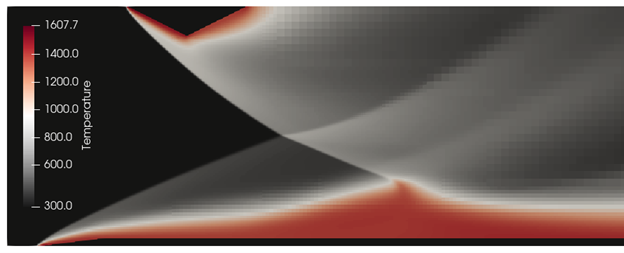Project Background
In recent years, combustion of green hydrogen has emerged as a strong candidate for carbon emission-free power conversion. Because such hydrogen is cleanly produced (e.g., through electrolysis powered by renewable energy sources) and releases no carbon when burned, there is significant interest in transitioning gas turbines away from natural gas to hydrogen. Such transitions are well underway in Utah, where the Intermountain Power Agency is already constructing an 840 MW power plant based on gas turbines operating with 30% hydrogen slated for completion in 2025. The goal of the project is to burn 100% hydrogen by 2045.
The twenty-year transition to exclusive use of hydrogen highlights that there remain several technical challenges to overcome. A number of these challenges are a result of the unique flame dynamics of hydrogen. Thus, improving the design of next generation, hydrogen-based, gas turbines requires a deeper understanding of hydrogen flames in such systems. Simulations can provide cheap and fast insight in the design process of such devices but require accurate models of the physics to provide meaningful results. Unfortunately, due to the unique features of hydrogen (i.e., extremely large diffusivities), accurate models describing important properties of turbulent premixed hydrogen flames (e.g., flame speed) do not exist.
The goal of this project is to better understand hydrogen flames and leverage this knowledge to improve existing models, thereby allowing for the accurate simulation of hydrogen flames in practical systems.
Student Role
The student's role in this project consists of three main tasks:
- Perform high-resolution simulations of turbulent premixed hydrogen flames
- Analyze this data to better understand how to overcome existing model deficiencies
- Leverage this knowledge to develop an improved model for hydrogen flames
In the first task, the student will learn how to use the Computational Fluid Dynamics (CFD) code used in our research group to simulate turbulent premixed hydrogen flames. This code is designed to simulate turbulent combustion at conditions found in practical systems like gas turbines and engines. By performing simulations at very high resolution, the student can resolve all fundamental physics and overcome the need for models. These simulations will provide the necessary data to better understand the underlying physics.
In the second task, the student will learn about existing models and analyze the results from their high-resolution simulations in the context of these models. Deficiencies in existing models will be studied and ideas for improvement will be identified.
In the third task, the student will use what they've learned to develop an improved model capable of capturing important properties of hydrogen flames. The output of this model will be compared to the initial simulations and deficient model results to assess the level of improvement.
Student Learning Outcomes and Benefits
This research experience will provide students with the background and skills required for a range of Mechanical and Aerospace engineering positions in industry, academia, or government laboratories. Major technical outcomes include:
- Learning to use an advanced CFD code for the simulation of turbulent reacting flows. Such codes are used to simulate, for example, rocket, aircraft, and car engines. The skills are easily transferable to non-reacting systems relevant to, for example, aircraft design and wind turbines.
- Familiarity with High Performance Computing (HPC) cluster usage. HPC clusters are collections of many communicating computers that allow for simulation of computationally intensive problems. Students will learn how to run their simulations on a cluster, a skill transferable to clusters used by industry/academia/government labs.
- A better understanding of data analysis and visualization with Python/MATLAB. Students are welcome to develop skills in whichever scripting language they prefer.
- Familiarity with presenting technical work. The student will be expected to meet with the mentor weekly and present their work to the entire group monthly. The ability to present technical topics clearly and succinctly is an invaluable skill in engineering.

Alex Novoselov
I believe that undergraduate students who take part in the SPUR program should perform relevant, achievable, and interesting research. The mentor plays a big role in making this possible. Relevant research requires that the mentor provides worthwhile research to the students, rather than simple toy problems that have no actual bearing to the research community. Achievable research requires that the mentor understands the background abilities of the student, plans the project out accordingly, and provides adequate support to the student so they can learn the necessary skills and topics to succeed. Interesting research requires that the mentor presents the topic in a way that appeals to the student by considering their background and interests.
It is my philosophy that for students to excel at research, there needs to be a combination of time spent self-studying and learning from the mentor. For this reason, I will meet with the student weekly to assess their progress and provide important input and lessons. The student will be guided on which topics they should learn and be provided with the relevant sources for this knowledge but are always encouraged to communicate with the mentor if they are struggling. This can occur through additional meetings or email depending on the preferences of the student.
One of the most important qualities in a successful engineer is the ability to clearly present technical results. Students will be offered opportunities to hone their skills both in meetings with the mentor, as well as in monthly meetings with the entire research group. I believe providing constructive feedback to students regarding their presentations allows them to better develop their skills.
